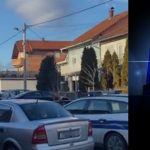July 22, 2023 – The KBC Zagreb Clinic for Diseases of the Heart and Blood Vessels, in cooperation with the Special Hospital Radiochirurgia, presented the results of the innovative treatment of heart arrhythmia with radiofrequency ablation technology. It is a procedure that has been performed only about seventy times in the world.
As Index writes, the procedure was performed for the first time on a patient aged 67. He is currently on the list for a heart transplant because he has been suffering from severe heart disease for years, having overcome his first heart attack at the age of 33. After many years, there was damage and numerous scars on the patient’s myocardium, and all such scar tissue in the heart can be a source of potential arrhythmias.
After treating the arrhythmia with more conventional methods, the patient did not stabilize and could not be discharged, so KBC Zagreb contacted Radiochirurgia for radiofrequency ablation of the arrhythmia.
How it’s performed
It is a method by which the site of the arrhythmia is irradiated and the focal point of the arrhythmia eliminated. The operation was carried out with the help of the Inheart system, four-dimensional CT and radiosurgery technology. The exact zone to be treated with radiation was determined, and the physicist determined the dose required for the therapeutic procedure.
Oncology and radiotherapy specialist Hrvoje Šobat pointed out that team cooperation was necessary for such a challenging procedure. His team was responsible for applying the cardiologist’s requirements to cardiac radiation. “It is a complicated process since the heart is not a stationary target. It moves with breathing and with its work, and the goal is to ensure healthy tissue is irradiated as little as possible,” Šobat explained.
Depending on the technique used, the procedure lasts from 10-15 to 50-60 minutes, and the patient must remain as calm as possible.
Davor Miličić, head of the Clinic for Diseases of the Heart and Blood Vessels, stated that ten patients a year would be candidates for this type of therapy. “The indication for treating patients with radiofrequency ablation is a team decision that applies to patients who cannot be treated with conventional methods,” said Miličić. It is a non-invasive procedure, and patients can expect temporary disturbances after the procedure, such as trouble swallowing.
The Clinic Deals With the Most Complex Cases
Miličić pointed out that the clinic is the seat of six reference centres in cardiology, and they receive the most complex patients from Croatia and abroad. “With that in mind, we sometimes have to introduce innovative treatment methods,” he said.
“The patient will be discharged from the hospital today, and the procedure was performed on July 17,” Miličić confirmed the patient’s condition.
Milivoj Novak, assistant director for health care quality and supervision, emphasized the importance of this project as an example of work at KBC Zagreb, which, despite the renovation and reconstruction of the building, continues to be run as a zero-category hospital and provides top-quality medicine.
“For us, the patient is always in focus, especially with such difficult and complex cases. I am proud of my team and grateful to KBC Rebro for its cooperation,” said the Director of the Radiochirurgia Special Hospital, Dragan Schwarz.











